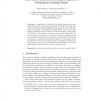Free Online Productivity Tools
i2Speak
i2Symbol
i2OCR
iTex2Img
iWeb2Print
iWeb2Shot
i2Type
iPdf2Split
iPdf2Merge
i2Bopomofo
i2Arabic
i2Style
i2Image
i2PDF
iLatex2Rtf
Sci2ools
EWCBR
2004
Springer
2004
Springer
Case-Based Relational Learning of Expressive Phrasing in Classical Music
An application of relational case-based learning to the task of expressive music performance is presented. We briefly recapitulate the relational case-based learner DISTALL and empirically show that DISTALL outperforms a straightforward propositional k-NN on the music task. A set distance measure based on maximal matching - incorporated in DISTALL - is discussed in more detail and especially the problem associated with its ‘penalty part’: the distance between a large and a small set is mainly determined by their difference in cardinality. We introduce a method for systematically varying the influence of the penalty on the overall distance measure and experimentally test different variants of it. Interestingly, it turns out that the variants with high influence of penalty clearly perform better than the others on our music task.
| Added | 01 Jul 2010 |
| Updated | 01 Jul 2010 |
| Type | Conference |
| Year | 2004 |
| Where | EWCBR |
| Authors | Asmir Tobudic, Gerhard Widmer |
Comments (0)

